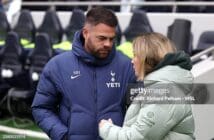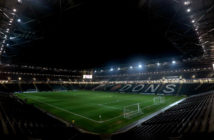Graham Potter is not the type of manager to make outlandish statements in press conferences. Neither is he one to berate referees from the safety of his dugout. His self-confessed lack of sartorial elegance has even stopped him from becoming a touchline fashion icon.
Brighton’s head coach is instead the type who allows the football his side’s play to do the talking.
Saturday’s 2-0 win against Leeds United combined with Fulham’s defeat at Chelsea later in the day has all but secured the Seagulls’ Premier League survival for a second consecutive season under the former Östersunds and Swansea boss.
Guiding Brighton to mid-table security after the previous manager Chris Hughton had done similar in the two seasons before Potter’s arrival has understandably not seen him heralded as one of the top flight’s elite coaches. Scratch beneath the surface and it becomes clear that Brighton could hardly be more different from the rigid side that was in free-fall when Hughton left in May 2019.
In his unveiling following his move from the Liberty Stadium to the Amex in the same month, Potter made it clear that his focus was not on the remarkable nature of his ascent from coaching in the fourth tier of Swedish football to the Premier League in less than 10 years.
“It’s not about me. It’s about helping the players improve and help the players enjoy their football because then there’s a chance that it can transfer into positivity and good performances.
“We try to play football in a positive way. That’s how I’ve always worked.
“I think you have to look at the quality of the players that you have and the attributes that they have and you want to try and play to their strengths.”
– Graham Potter in his introductory press conference as Brighton Head Coach in May 2019
In that first meeting with the media, the former Southampton and West Brom left-back mentioned the need to improve, both in terms of himself as a coach and the team as a whole, on nine separate occasions. This commitment to continuously develop has been evident throughout Potter’s early Brighton career.
Simply beating a Leeds outfit that have earned plenty of plaudits of their own this season, on the back of a run of three games without a win that included a defeat to bottom-of-the-table Sheffield United last weekend, is worth praise in itself, although the most impressive aspect of the victory over Marcelo Bielsa’s side was a defensive effort that denied the visitors a single shot on target.
Goalkeeper Robert Sanchez has been excellent since usurping Mat Ryan between the sticks in December last year, yet he barely had to get his gloves dirty thanks to the performances of those in front of him.
His journey from battling relegation to League Two with Rochdale last season to earning a call-up to the Spanish National Team in March is a sign of the continual development of Brighton as a team.
Pascal Gross, Adam Lallana and Steven Alzate have all been used in unfamiliar positions by Potter this season to decent effect. However, it is the deployment of centre-backs Joel Veltman and Dan Burn as wing-backs in a back five that has gone a long way to helping the Seagulls become the third-best defence in the Premier League according to their expected goals against value.
They can sometimes look unconventional, particularly when 6 ft 7 Burn is rampaging down the left-wing, but it is a tactical move that undeniably works. Veltman’s composure in possession makes him a valuable aspect of Brighton’s build-up play in possession, and against Leeds, Burn was pushed forward aggressively to create an option for Sanchez to kick long to in order to bypass the visitors’ press from the front.
Combined with the central defensive trio of Lewis Dunk, Ben White and Adam Webster, the Brighton backline has quite the physical presence. This is not an overload of centre-backs for defensive purposes in the tradition of a Tony Pulis or Sam Allardyce though, Burn and Veltman twice linked up in the opposition penalty area in the second-half on Saturday only for the Dutchman to fail to work Illan Meslier when well positioned.
Whilst both wing-backs played well, it was Dunk who stood out. Potter described his performance as ‘sensational’ after the game, and although the locally-born defender was highly rated before his current head coach arrived on the south coast, his game has been taken to a new level due to the increased responsibility that has been placed on his shoulders.
Brighton under Potter are a side that usually stations their defensive line high up the pitch, forcing Dunk to organise a backline that often leaves 40 yards of space behind them. As well as making light work of this task, he also timed his challenges exceptionally against Leeds, not allowing Patrick Bamford an inch of space to work with before the forward was substituted early in the second period.
Dunk’s defensive qualities were never in doubt though. It is his role in helping Brighton adapt from a reactive side under Hughton to one more accustomed to spending the majority of the game with the ball that has made him one of the Premier League’s standout central defenders.
Whether this ability was always there and Potter simply provided him with a platform to showcase it or it is another sign of the Seagulls’ recent progress, his composure in possession and ability to find teammates with either short or long passes not only allows Brighton to successfully play a brand of football that is easy on the eye but also calls into question why Dunk has not been more regularly involved in the England set-up at this point.
It would almost be a cruel irony should the man stationed to his right beat him to a first senior cap, but White, who excelled last season on loan at Elland Road in the Championship, appears every bit his captain’s successor.
The 23-year-old was so confident on the ball against his former teammates that he regularly took the opportunity to stride out from his own half, often reaching the edge of the opposition penalty area before picking out a more attack-minded colleague.
Having taken lead in the 13th minute through a Pascal Gross penalty after Danny Welbeck had been hauled down in the box by Ezgjan Alioski, Potter showed another of the tactical traits that make him such an exciting prospect in managerial terms.
His flexibility in respect to the game plans he employs from week to week, along with his capacity to alter the course of 90 minutes through tweaks and substitutions, has stood out thanks to his side’s ability to change between a back four and a back five with ease.
The one-time university football coach also has an understanding of when to change the approach from dominating the ball to sitting deeper and hitting teams on the counter-attack.
Being a goal to the good early on allowed Brighton to do just that against Leeds. Although the visitors forced a succession of corners as half-time approached – often cleared by the towering Burn at the back post – they rarely fashioned opportunities to equalise and it was the home side who looked the more likely to find the next goal through well-executed breakaways.
A significant aspect of this ploy was yet another standout performance from Yves Bissouma in the middle of the park, in what was another indication as to why some of Europe’s top clubs are reportedly interested in signing him.
With the visitors missing Kalvin Phillips due to a knee injury, the Malian midfielder ran the show, keeping the ball moving with intelligent passes and complimenting it with equally intelligent interceptions and tackles.
Bissouma’s evolution from a talented yet inconsistent ball-winner under Hughton to one of the Premier League’s most sought after all-round midfielders is as good of an indication that whilst improving the collective has been Potter’s priority, numerous individuals have progressed under his tutelage also.
The fundamental flaw in Potter’s Brighton has been an almost comical lack of cutting edge in front of goal. Striker Neal Maupay has been particularly guilty of missing a number of gilt-edged opportunities that would have seen Brighton secure their Premier League status weeks ago, and could have even had them on the periphery of a top-half finish had they have picked up the results that their performances have merited.
This was again evident against Leeds. Leandro Trossard, Welbeck and Maupay all missed presentable chances throughout the 90 minutes despite regularly combining fantastically and terrorising a defence that had kept Manchester United at bay only a week beforehand.
Even when Brighton won the early penalty there was a sense of jeopardy present having already missed three of the seven spot-kicks they have been awarded this season, including two in one afternoon against West Brom in February – a game they somehow found a way to lose 1-0.
Gross’ effort on this occasion was low and hard into the bottom corner, leaving Meslier with little chance in what was a rare example of clinical finishing that was only matched by Welbeck deep into the second-half.
Even though he too could be accused of a lack of decisiveness in the final third, the former Manchester United and Arsenal forward is another that Potter appears to have worked his magic on.
Injury problems have become an unfortunate reality of the latter years of his career, but when fit and available Welbeck has proven to be a useful tool to stretch a game with his pace, and his role in this Brighton outfit has also allowed him to showcase his quality on the ball.
A number of sharp turns and intricate combinations with Trossard made Welbeck Brighton’s obvious attacking threat, although he saved his best moment until the 79th minute. The Leeds defence failed to adequately clear the ball, allowing the 42-cap England international to back-heel his way out of the clutches of Pascal Struijk before firing the ball beyond Meslier with his weaker left foot.
Brighton saw the victory out competently to move up to 14th in the Premier League and once again make suggestions that there has been no tangible progress since the change of head coach appear baseless.
“(It was)a big victory and a big performance. One with a lot of quality and a lot of character.
“We deserved the two-goal lead. Sometimes you don’t get what you deserve.
“It was one of our best performances. You have to match Leeds for their effort and honesty and I felt we did that really well.”
– Brighton Head Coach Graham Potter
All of these positives, present in both the victory over Leeds as well as plenty of Brighton’s other performances this season, make it beyond belief that they have only won three times at home in the current campaign. Should they continue to play at this level at the beginning of next season, it will surely only be a matter of weeks before they match that tally, particularly if a clinical forward player is signed in the summer transfer window.
It was his master’s degree in leadership and emotional intelligence, the player-led theatrical productions he used to generate team spirit at Östersunds, and the peculiarity of a British coach climbing the football pyramid on foreign soil that made Potter come across as unique in his early months in British football.
These factors almost pale into insignificance due to the impact that he is having on Brighton in terms of improving them on the pitch.
His ability to be tactically flexible, combined with an outstanding reading of how a game is playing out, is evidently underpinned by a desire to improve the players that work under him, and even though he has been linked with the managerial vacancy at Tottenham in the wake of José Mourinho’s departure, seeing just how far he can take this Brighton side could be an equally intriguing prospect.
Follow us on Twitter @ProstInt
Apologies, but no results were found for the requested archive. Perhaps searching will help find a related post.EPL
Brighton and Hove Albion
Nothing Found
![Prost International [PINT]](https://prostinternational.com/wp-content/uploads/2021/08/PINTtFontLogoRoboto1536x78.jpg)


